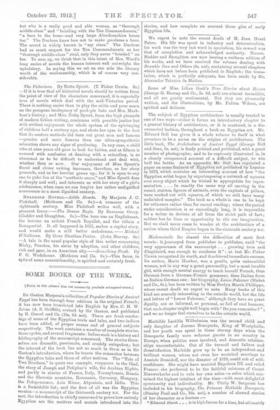SOME BOOKS OF THE WEEK.
[Notice In this column (loss 'sot I3ocossos.4 preclude subtle von! revisu.] Sir Gaston Maspero's collection of Popular Stories of Ancient Egypt has been through four editions in the original French; it has now been translated into English by Mrs. C. H. W. Johns (A. S. Griffith), revised by Sir Gaston, and published by H. Grevel and Co. (10s. 6d. net). There are fresh render- ings of some of the Egyptian texts and tales, and two indices have been added, of proper names and of general subjects respectively. The work contains a number of complete stories, three cycles, and several fragments: before each is a history and bibliography of the manuscript concerned. The stories them- selves are dramatic, passionate, and crudely outspoken; but the interest of the book lies not so much in them as in Sir Gaston's introduction, where he traces the connexion between the Egyptian tales and those of other nations. The "Tale of Two Brothers," to quote one example, reappears in the Iliad, the story of Joseph and Potiphar's wife, the Arabian Nights, and partly in stories of France, Italy, Transylvania, Russia and the Slavonic countries, Roumania, Germany, Hungary, the Peloponnosus, Asia Minor, Abyssinia, and India. This is a formidable list; and the first of all was the Egyptian version—a manuscript of the thirteenth century B.C. For the rest, the introduction is chiefly concerned to prove how entirely Egyptian are the matters and morals introduced into the stories, and how complete an account these give of early Egyptian life.






































 Previous page
Previous page